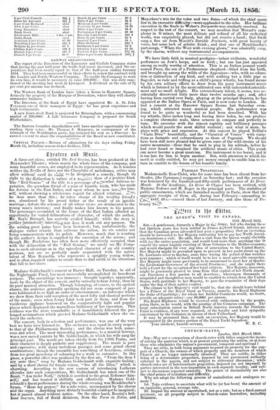Madame Goldschmidt's concert at Exeter Hall, on Tuesday, in aid
of the Nightingale Fund, has most successfully accomplished its beneficent purpose. The assemblage was immense ; brought together, apparently, yore by the object of the concert, and by curiosity to hear Jenny, than by its pure musical attraction. Though belonging, of course, to the opulent classes, the audience generally speaking did not seem composed of per- sons habituated to so high an order of entertainment ; an inference which we drew from their cold reception of the most lofty and classical portions of the music, even when Jenny Lind took part in them, and from the vociferous applause bestowed on the comparatively light and popular pieces which displayed the marvellous brilliancy of her execution. This coldness was the more remarkable as it immediately followed the pro- longed acclamations -which greeted Madame Goldschmidt when she en- tered the orchestra.
The concert, both in selection and performance, was one of the very best we have ever listened to. The orchestra was equal in every respect to that of the Philharmonic Society ; and the chorus was both flume- robs and select. The most interesting performance, to a musical listener, 'was a new sacred cantata by Mr. Goldschmidt, in which his wife sang the principal part. The words are taken chiefly from the 130th Psalm, and their character is deeply pathetic and supplicatory. The music is pure and expressive, with many melodious passages and some grand choral combinations ; though the ensemble has something of heaviness, arising from too great monotony of colouring for a work so extensive. In this piece, a powerful effect was produced by the first air, "From the deep I cry unto thee " sung by Madame Goldschmidt with exquisite feeling; and by a short,chorus for female voices, "Sea all the lilies," which is charming. According to the new custom of introducing Lutheran chorales into such compositions, Mr. Goldschmidt has taken one of the finest, " Aus tiefer Noth, (which is ascribed to the great Reformer him- self,) and has treated it skilfully and effectively. Madame Gold- pelimidt's finest performance during the whole evening was Mendelssohn's hymn, "Hear rainPrayer," for a solo voice accompanied by the chorus and the organ. Anything more divinely beautiful could oot be imagined ; hut it passed almost without notice. On the other hand, Rossini's bril- liant bravura, full of florid divisions, from the Turco us Italia, and Meyerbeer's trio for the voice and two flutes—of which the chief merit lies in its excessive difficulty—were applauded to the echo. Her brilliant execution in the finale to Webees Euryanthe was similarly received. In respect to the rest of the concert, we may mention that Mozart's sym- phony in G minor, the most delicate and refined of all his orchestral works, was exquisitely played, but did not receive a hand ; that Swift sang a fine air from Mozart's Davidde Penitente, with great beauty of voice, but some lack of' artistic finish ; and that one of Mendelssohn's part-songs, "When the West with evening glows," was admirably sung, by the chorus, without any instrumental accompaniment.


























 Previous page
Previous page